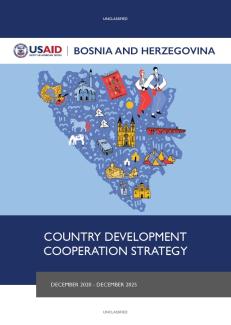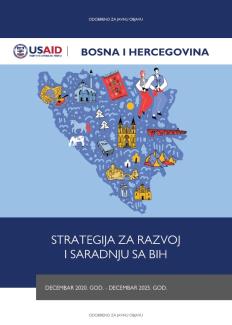USAID’s goal for the 2020-2025 Country Development Cooperation Strategy (CDCS) is to support Bosnia and Herzegovina citizens to hold their government accountable, participate in a robust, legitimate economy, and value and promote an inclusive society. USAID expects to refocus civil society on building constituencies and increasing the active roles that men, women, youth, and members of marginalized groups take in their communities and in political life. USAID’s strategic approach centers on amplifying outreach and coordination with other donors, particularly the EU, which will allow for an increasing number of reform champions in government who can make tangible progress on reforms needed for the country’s further Euro-Atlantic integration.
The key to the realization of this strategy will be the achievement of two development objectives (DOs): (1) government accountability to citizens strengthened and, (2) socio-economic conditions improved. These DOs will enable USAID to support Bosnia and Herzegovina (BiH) to take charge of its development and increase commitment and capacity in its journey towards self-reliance.
Development Objective 1, Government Accountability to Citizens Strengthened, USAID will address corruption by coordinated interventions through legislation, the judiciary, media, and civil society. USAID will utilize a two-fold approach to build a solid citizen-government relationship based on trust and transparency. USAID will support citizens striving for more democratic and transparent decision-making processes, and it will enhance the government’s response to citizens’ demands. USAID will catalyze broader, more inclusive citizen engagement for a civil society that serves citizens’ needs. USAID efforts to enhance government effectiveness will focus on public sector corruption, human rights violations especially trafficking in persons and gender based violence, and inadequate legal solutions and public services. This objective will also restore citizens' desire to live in BiH by creating the conditions for enabling inclusive citizen and political engagement for all population groups. USAID support for strong democratic governance will limit opportunities for malign influences. Countering corruption and building an adequate legal framework will counter malign practices outright and provide the basis for implementing EU-oriented solutions for development. These efforts will help BiH make progress along its Euro-Atlantic integration path.
Development Objective 2, Socio-Economic Conditions Improved, USAID will help BiH’s national government more effectively address major issues and reforms needed by strengthening BiH’s rule of law, investigative journalism, and citizen oversight, while working to empower the judiciary to prosecute high-level corruption cases. While enhancing these formal public structures to combat corruption, USAID will capitalize on a stronger, more active citizenship for oversight and a courageous, determined team of investigative reporters to build a strong anti-corruption bloc. USAID will also stimulate strong and sustainable citizens’ activism against corruption by empowering and promoting civil society as a credible anti-corruption force. Support of reforms that comply with EU regulations, put forth effective approaches to prevent corruption, and enable an investor-friendly framework will help anti-corruption efforts. USAID will support the creation of a regulatory framework in accordance with Energy Community Treaty obligations and EU Energy Directives and integration of the BiH energy sector into regional and EU energy markets. USAID will also support financial stability and fiscal discipline, and work to improve overall public financial management. USAID will tap into BiH’s tourism potential to drive the country’s economic growth and support policy, regulatory and institutional changes that will create a solid base for further tourism development.
This CDCS was developed and finalized in 2020 as COVID-19 became a global pandemic. USAID/Bosnia & Herzegovina will continue to monitor its potential impact and if needed, the Mission will re-evaluate the strategic approach.


